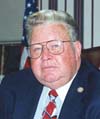
As a member-owner and former lineman, John Worthington, of Vernon, has worn a variety of hats at West Florida Electric Cooperative. He serves both as president and District 6 trustee on WFEC's board and was recently chosen by his fellow trustees to represent the Co-op on the board of its power supplier, Alabama Electric Cooperative, or AEC. Here, he discusses his role at WFEC and the Co-op's part in the community and the lives of its members:
How have your experience as a businessman and former WFEC employee helped you as a Co-op trustee, and what insights has your role as a trustee given you that are valuable in other areas of your life?
"Working at WFEC as a lineman, I learned a lot about what it takes to do the work. So when we talk, as a board, about an operations project, I generally know what the job will involve.
Being a board member has also been a real learning process for me. When you're a trustee, you have to know the inner workings of the whole Co-op, on the inside and the out.
It's given me more insight in dealing with a larger group of people. Working as a small businessman, you just make decisions for yourself. But when you're dealing with a larger group, you're able to draw off their experience as well as your own. Overall, I'd say that being a trustee has helped me make better decisions in my business life, and my business life has helped me make better decisions as a trustee."
How do you envision the role of WFEC's trustees and CEO?
"It's the trustees' responsibility to hire someone we think will be a good CEO and set the policies for him to operate by. Then it's his responsibility to implement those policies and oversee the Co-op's day-to-day operations."
What do you consider to be WFEC's greatest strengths, and why?
"I think an important strength is its ownership by its consumers, or members, who are mostly rural people. They have an understanding of what the Co-op does for them. WFEC has an opportunity to interact with the community and its members more than a huge corporation would.
Another great strength is that WFEC is a member-owner of AEC, which guarantees us a supply of power at reasonable rates. We're working together to reach the goal of having as low a rate as possible for rural members.
Also, WFEC has downsized. We're about as lean as we can get, and we have a good workforce - people who not only work for the Co-op, but work to improve the Co-op."
WFEC has played a vital role in creating jobs in the area in recent years. Why should an electric utility place such importance on supporting economic development efforts?
"WFEC is involved in economic development because we are primarily a rural co-op and serve residential members. Any large, constant loads we can get into our area help offset the cost of power for residential members.
Also, the more jobs we create, the more homes are going to be built, which will improve our density. Compared with investor-owned utilities, which typically have about 50 customers per mile of line, we only have about five per mile. The Co-op's got over 4,000 miles of line. And the more people who move into those gaps, the more the cost of power and line upkeep can be spread out.
It also creates jobs for the young people when they finish school. I'd like to see us create a lot of good jobs so people don't have to leave to earn a good living. So economic development is good for the whole area, and it's good for the Co-op."
As other states throughout the nation restructure their electricity markets, what should Florida residents expect, and how is WFEC preparing for a changing industry?
"From what I've heard about deregulation, residential customers can expect an increase in their electric bills if Florida deregulates the industry. I think big electrical companies are going to come in and 'cherry pick' the largest industries in the state, and it isn't going to be a real benefit to residential consumers.
WFEC has an excellent group of employees and a management team who are keeping on top of what's going on in the industry. They're preparing the Co-op by downsizing and keeping our options open as we see what the state's going to do. I don't know what other steps we can take at this point besides downsizing and avoiding a lot of debt, until we determine what actions the state will take. It's really an unknown."
